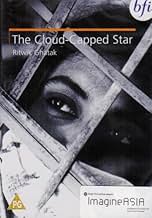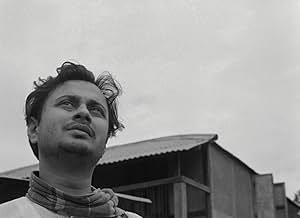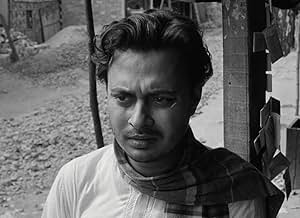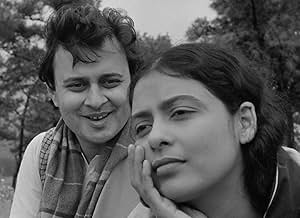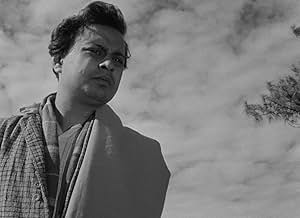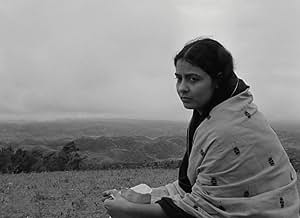IMDb रेटिंग
7.8/10
3.5 हज़ार
आपकी रेटिंग
एक निस्वार्थ युवती अपने अप्रसन्न परिवार के लिए अपनी खुशी का त्याग करती है.एक निस्वार्थ युवती अपने अप्रसन्न परिवार के लिए अपनी खुशी का त्याग करती है.एक निस्वार्थ युवती अपने अप्रसन्न परिवार के लिए अपनी खुशी का त्याग करती है.
- पुरस्कार
- कुल 1 नामांकन
Ranen Ray Choudhury
- Baul singer
- (as Ranen Chowdhury)
फ़ीचर्ड समीक्षाएं
'Meghe dhaka tara' or the 'Cloud-clapped Star' is definitely one of the best films ever directed in Bengali,and it vividly portrays the directing skills of Ritwik Ghatak. The story revolves around a lower-middle class Bengali family, who lived in the refugee colonies situated in the outskirts of Kolkata. The father of the family was a English teacher and his eldest son 'Shankar'(Anil Chatterjee) was a promising young classical singer while the youngest son 'Montu' played football. Nita and Gita were two sisters, the former being somewhat responsible, caring, loving while the latter was simply a beauty conscious,lazy, insincere flirt. Owing to circumstances, Nita had to work as a private-tutor in order to feed her family as no one else had any urge, capacity or rather consciousness about their poverty. Another important character of the movie was Sanat, a talented Physics research fellow whom Nita sponsored for she had affections on him. According to the story Nita a working woman, couldn't spare time on him and Gita, her sister began having relations with him and eventually they married. Nita was heartbroken and neither Sankar nor their father supported their marriage. Sanat after his marriage didn't continue his research and found himself a job of high salary. Eventually Sankar established himself as a singer, Montu found a job in a factory, while Nita's health began deteriorating. It was found she was suffering from TB. She was sent to a sanatorium upon the mountains to recover and the film ends with Nita's death. One the last scenes perhaps the best of the film wonderfully shows Nita's love for life, her urge for struggle and her positive thinking. The film's one of the most impressing assets is the song, 'Je raate mor duar Guli' song beautifully by Debabrata Biswas. It was really suitable with the sad situation after Gita's marriage. The film over all portrays the life-struggle of a promising family with contemporary middle class livelihood. Actings of Anil Chatterjee and Supriya Devi is of high quality and the over all direction, screen-play, music equally good. The 'Lost Love' by William Wordsworth finds a perfect match in the movie.
For someone who is not quite in the know, the subject matter of the story is to us who grew up in that time and place quite mundane. I know exactly the kind of girl Ghatak is talking about here, even a decade ago there were many of them I could see while commuting in Kolkata. Things have changed, though, and it is nice to have such a compelling piece of art to retain those memories.
But of course Ghatak is working on two planes in this movie. Ostensibly about the hapless girl driven by circumstance, the poor, gentle, tough, dreamy girl who is laid bare by the vicissitudes of existence may as well be that other great love of the director's life, mother Bengal.
But of course Ghatak is working on two planes in this movie. Ostensibly about the hapless girl driven by circumstance, the poor, gentle, tough, dreamy girl who is laid bare by the vicissitudes of existence may as well be that other great love of the director's life, mother Bengal.
If Satyajit Ray is the virtuoso of Indian cinema, Ghatak is the maverick. His films aren't as polished or subtle as Ray's, but he takes bold chances. Most blatantly in the sound design, with startling (and often beautiful) use of music, ambient noise, reverb, and effects that are almost sci-fi. Perhaps only Lynch is as distinctive in the employment of audio techniques. Not all of Ghatak's gambles pay off. Take, for instance, his insistence on casting the goofy Bijon Bhattacharya in most of his films. Bhattacharya's performance here isn't quite as damaging as his turn in THE GOLDEN THREAD, but it's easily the weakest aspect of the film. However, the primary focus is on Nita (Supriya Choudhury), the girl whose family walks all over her, and resent her for it in the process. As her brother chides her: "You'll suffer. Those who suffer, suffer forever." The family is a microcosm of Ghatak's obsession, the damage caused by the Partition, commenting on those who exploit the weak, and those who let themselves be exploited. It's high melodrama, but like Sirk, is done so artfully and effectively that it's a wonder to behold, with breathtaking images, unforgettable moments, and that idiosyncratic audio field.
This movie by Ritwik Ghatak is on the list of most of the Indian big times directors as one of the best movies of Indian cinema. The name of the movie means Cloud Capped Star what a lovely name.
The story is about a girl Nita (Supriya Choudhury) in a family who have migrated to India from Bangladesh, after the partition and staying in a small West Bengal town in poverty. Nita is the second child in the family of two boys, two girls and parents. After her father's (Bijon Bhattacharya) health detoriates she has to take the responsibility of being the bread winner because she is educated. Her beloved elder brother Shankar (Anil Chatterjee) is an aspirational singer and does not want to work. Her younger brother Mantu (Dwiju Bhawal) leaves his studies and becomes a daily laborer. Nita's boy friend Sanat (Niranjan Roy) gets attracted to her sister Gita (Gita Ghatak) and marries her. Nita carrier the burden of all these silently, but it takes toll on her health and mind who is finally sent to treatment in a remote hospital where Shankar goes to meet her in the end of the movie.
The movie though latent in high emotions is a superb story unfolding, with so much humanness that it touches your heart even today through it (sometimes) melodramatic 1960 style.
This was the first movie of Ritwik Ghatak that I have seen till date, and I consider myself fortunate, because Ritwik was called by the Life Time Oscar winner Satyajit Ray as his inspiration and Satyajit Ray always considered Ritwik the best in India.
Ritwik presents the drama with such finness of light and darkness, using great visuals, sound and symbols to present a tender emotion. The foliage, the train, the mountains, the soul rendering vocals remain with you for long after the movie.
A must see for all the students of good cinema. A master piece indeed! (Stars 7.75 out of 10)
The story is about a girl Nita (Supriya Choudhury) in a family who have migrated to India from Bangladesh, after the partition and staying in a small West Bengal town in poverty. Nita is the second child in the family of two boys, two girls and parents. After her father's (Bijon Bhattacharya) health detoriates she has to take the responsibility of being the bread winner because she is educated. Her beloved elder brother Shankar (Anil Chatterjee) is an aspirational singer and does not want to work. Her younger brother Mantu (Dwiju Bhawal) leaves his studies and becomes a daily laborer. Nita's boy friend Sanat (Niranjan Roy) gets attracted to her sister Gita (Gita Ghatak) and marries her. Nita carrier the burden of all these silently, but it takes toll on her health and mind who is finally sent to treatment in a remote hospital where Shankar goes to meet her in the end of the movie.
The movie though latent in high emotions is a superb story unfolding, with so much humanness that it touches your heart even today through it (sometimes) melodramatic 1960 style.
This was the first movie of Ritwik Ghatak that I have seen till date, and I consider myself fortunate, because Ritwik was called by the Life Time Oscar winner Satyajit Ray as his inspiration and Satyajit Ray always considered Ritwik the best in India.
Ritwik presents the drama with such finness of light and darkness, using great visuals, sound and symbols to present a tender emotion. The foliage, the train, the mountains, the soul rendering vocals remain with you for long after the movie.
A must see for all the students of good cinema. A master piece indeed! (Stars 7.75 out of 10)
Gorgeous cinematography, attractive cast, fantastic music. Seriously, I wish I could find the soundtrack for this one. The voices are like musical instruments, full of feeling, and whether we see a performance as a break in the action or hear music and sound effects in the background, it always has an aching, haunting sense to it. Ranen Roychowdhury's eternal river song was a real highlight. All of it works perfectly for the story, which is about a daughter (Supriya Choudhury) who sacrifices her own aspirations in order to support her parents, two brothers, and sister. What held me back from truly loving the film, however, was in just how much suffering this woman endures. My goodness, talk about misery porn.
There are just too many times while in a conversation about her hardships, this young woman slowly turns to the camera with a dreamy look on her face and says something beatific. Meanwhile, her poetry-quoting father has his head in the clouds and is then bed-ridden with an injury, her mother harps on her mercilessly, her older brother shamelessly borrows money from her while devoting all his time to music, her sister has her eye on her boyfriend, and her young brother's focus is on soccer. They are all seriously annoying.
Aside from the qualities of the music that I mentioned, I liked how it helped me understand in a subtle way why this young woman would continue to support her brother (Anil Chatterjee) for the ideal of his art. It's beautiful, and we can perceive that. Unfortunately, much of her other motivation felt like too much for a person to take - even a gentle soul like this one.
When her sister (Gita Ghatak) and her boyfriend (Niranjan Ray), who she's both supported, begin seeing one another without feeling conflicted at all, and then she reacts without saying a word - and even allows her sister to take her bangles - it was the straw that broke the camel's back for me. And that, of course, was not nearly the end of the suffering she has to endure.
The problem with the story is that while there is plenty of escalation - her woes and martyrdom continue to mount throughout the film - there is just not enough transformation. Deep into the film she mentions "I never protested the wrongs done to me. That's my sin," recognizing that she should have stood up for herself, but it's mild and in a victim blaming herself kind of way. There is never a true moment of realization that her own family is cruelly taking advantage of her, or a hint of bitterness. You could say that at the end, she's realized something while knowing that she is tragically too late, but by that point, over two hours in, it was too little, too late for this viewer.
The melodrama is moving and emotional, but I think would have been more powerful had the main character not been the "idealized Bengali woman," dutiful to the point of annihilation. I also wish it had been a little more explicit in its commentary about the Partition of Bengal, which I understand was one of director Ritwik Ghatak's main concerns, though I confess that my own ignorance might have caused me to miss unspoken references and cues. Overall though, it's worth seeing for its visual and aural beauty.
There are just too many times while in a conversation about her hardships, this young woman slowly turns to the camera with a dreamy look on her face and says something beatific. Meanwhile, her poetry-quoting father has his head in the clouds and is then bed-ridden with an injury, her mother harps on her mercilessly, her older brother shamelessly borrows money from her while devoting all his time to music, her sister has her eye on her boyfriend, and her young brother's focus is on soccer. They are all seriously annoying.
Aside from the qualities of the music that I mentioned, I liked how it helped me understand in a subtle way why this young woman would continue to support her brother (Anil Chatterjee) for the ideal of his art. It's beautiful, and we can perceive that. Unfortunately, much of her other motivation felt like too much for a person to take - even a gentle soul like this one.
When her sister (Gita Ghatak) and her boyfriend (Niranjan Ray), who she's both supported, begin seeing one another without feeling conflicted at all, and then she reacts without saying a word - and even allows her sister to take her bangles - it was the straw that broke the camel's back for me. And that, of course, was not nearly the end of the suffering she has to endure.
The problem with the story is that while there is plenty of escalation - her woes and martyrdom continue to mount throughout the film - there is just not enough transformation. Deep into the film she mentions "I never protested the wrongs done to me. That's my sin," recognizing that she should have stood up for herself, but it's mild and in a victim blaming herself kind of way. There is never a true moment of realization that her own family is cruelly taking advantage of her, or a hint of bitterness. You could say that at the end, she's realized something while knowing that she is tragically too late, but by that point, over two hours in, it was too little, too late for this viewer.
The melodrama is moving and emotional, but I think would have been more powerful had the main character not been the "idealized Bengali woman," dutiful to the point of annihilation. I also wish it had been a little more explicit in its commentary about the Partition of Bengal, which I understand was one of director Ritwik Ghatak's main concerns, though I confess that my own ignorance might have caused me to miss unspoken references and cues. Overall though, it's worth seeing for its visual and aural beauty.
क्या आपको पता है
- ट्रिवियाMeghe Dhaka Tara (1960) is part of the Criterion Collection, spine #993.
- गूफ़When Nita meets her former lover at the tree near the pond (after about 90 minutes), a microphone is visible in the top left corner.
- भाव
Baul singer: [singing] I wasted all my good days, Now, in bad times, I've come to the river's edge, Boatman, I don't know your name, Who shall I call out to? Who shall I call out to? Oh, my heart, who will take you across? There is a boat but no boatman, There is no one on the river bank, There is no one on the river bank...
- कनेक्शनFeatured in The Story of Film: An Odyssey: New Directors, New Form (2011)
टॉप पसंद
रेटिंग देने के लिए साइन-इन करें और वैयक्तिकृत सुझावों के लिए वॉचलिस्ट करें
- How long is The Cloud-Capped Star?Alexa द्वारा संचालित
विवरण
- रिलीज़ की तारीख़
- कंट्री ऑफ़ ओरिजिन
- आधिकारिक साइट
- भाषाएं
- इस रूप में भी जाना जाता है
- The Cloud-Capped Star
- उत्पादन कंपनी
- IMDbPro पर और कंपनी क्रेडिट देखें
- चलने की अवधि
- 2 घं 6 मि(126 min)
- रंग
- ध्वनि मिश्रण
- पक्ष अनुपात
- 1.33 : 1
इस पेज में योगदान दें
किसी बदलाव का सुझाव दें या अनुपलब्ध कॉन्टेंट जोड़ें


